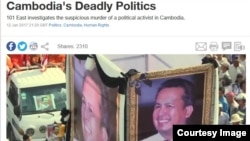Police on Sunday shut down a private screening of a documentary about the death of prominent government critic Kem Ley last year that linked the security forces to the man on trial for his murder.
The screening, organized by the Khmer Student Intelligent League Association (KSILA), was prevented from taking place after dozens of mixed security forces turned up at the private residence where the Al Jazeera film, “Cambodia’s Deadly Politics”, was due to be shown.
The filmmakers had tracked down friends and family members of the man suspected of killing Ley, Oeut Ang. They told Al Jazeera that Ang had attended meetings with senior district military and police officials in the weeks prior to his alleged crime and suggested that he had been hired by a former military commander - hinting at possible state involvement in the high-profile murder.
Analysts and rights workers this week criticized the authorities’ actions, saying the strong-arm tactics were further evidence of the erosion of freedom of expression under Prime Minister Hun Sen.
“This contradicts the law. If we hold private screenings, there is no need to provide notice or ask for legal permission unless it’s a public place,” Am Sam Ath, monitoring manager at local rights group Licadho, told VOA Khmer.
Meas Ny, a social development researcher, said the images of security forces shutting down the screening reflected badly on Hun Sen’s government.
“They used to talk about concerns over a ‘color revolution’. Revolutions evolve from small things, so they are trying to prevent any events,” he said.
“The prohibition itself will not have any effect. This story has already reached the general public,” he added.
A spokesman for the police in Russey Keo district, where the screening was due to be held, defended the crackdown.
“This group of youths had planned to screen anarchy. That’s why the authorities went to advise and reach and educate [them],” he said.
No arrests were made, he added, although four youths were detained for over four hours and made to sign agreements pledging not to screen the film without permission in the future, according to the head of the group that organized the event.
Moung Sony, president of KSILA, said the group’s intention was not to “cause anarchy”, but rather to spread awareness of the unanswered questions surrounding Ley’s death.
“I asked them which law or article [prohibited the screening],” he said. “They didn’t answer. It’s not unlawful; it’s a political move.”







